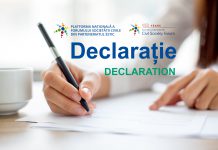The parties agreed to continue their efforts to bring the Republic of Moldova (hereafter referred to as Moldova) closer to the EU, acknowledging Moldova’s European aspirations. They discussed the internal developments in Moldova and agreed on the importance of the ambitious reform-oriented agenda and of a stable political, social and economic situation in the country. They welcomed the staff-level agreement between the Moldovan Government and the International Monetary Fund (IMF), noted the commitment of Moldova to fully cooperate with the international financial institutions and the EU to ensure economic recovery and looked forward to the signing of the agreement with the IMF.
The sides agreed on the need to uphold human rights standards, democratic principles and the rule of law in Moldova, stressing the role of civil society in this context. They welcomed recent positive steps in this direction and the commitment of the Moldovan authorities to address outstanding human rights issues and ODIHR recommendations for future elections. They agreed that further progress by Moldova to consolidate respect for these principles will reinforce their mutual ties. The EU side welcomed Moldova’s readiness to set up a regular dialogue on Human Rights.
The EU and Moldova took stock of concrete achievements in sectoral cooperation. They welcomed in particular the decision at the Energy Community Treaty Ministerial Council in Zagreb on 18 December concerning the accession of Moldova to the Energy Community and agreed on the importance of Moldova’s implementation of the related commitments. They also agreed on the value of the annual Action Plan Implementation Tools, as instruments to strengthen the domestic reform process in Moldova as well as EU-Moldova relations.
The sides emphasized the many opportunities provided by the Eastern Partnership, as a specific Eastern dimension of the European Neighborhood Policy, to strengthen the relationship between the EU and Moldova as well as among the Partner countries. They expressed their joint commitment to continuing the implementation of the Eastern Partnership, in both its bilateral and multilateral track.
The parties noted the need to strengthen administrative capacity at all levels in Moldova in order to further advance relations. In this context, they agreed to cooperate closely in defining and implementing a Comprehensive Institution-Building programme, within the framework of the Eastern Partnership.
The sides agreed to promote further reforms and continued EU approximation in Moldova. They confirmed that negotiations on an EU-Moldova Association Agreement will be launched in Chisinau on 12 January 2010. They reiterated their vision of the new agreement as an innovative and ambitious document going beyond the established framework of cooperation and opening a new stage in their relations, notably by enhancing political dialogue and deepening sectoral cooperation.
Recognizing that Moldova has exempted all EU citizens from the visa obligation, the parties underscored the need for full and effective implementation of the visa facilitation and readmission agreements by the authorities of EU Member States and Moldova. They welcomed the implementation of the Mobility Partnership. At the same time, they agreed to strive to set up in 2010 a dialogue examining the conditions for visa-free travel of Moldovan citizens to the EU as a long-term goal, taking into account the EU Global Approach to Migration and keeping in mind that gradual steps towards full visa liberalization would be taken provided that conditions for well-managed and secure mobility were in place.
The parties reaffirmed their shared objective to establish a Deep and Comprehensive Free Trade Area (DCFTA), when the relevant conditions are met and expressed their commitment to make progress in line with the agreed set of steps towards that objective. They agreed on the importance for Moldova to pursue reforms in line with the EU-Moldova Action Plan in general, and in particular in all areas relevant for a DCFTA.
The parties discussed ways to increase the efficiency and impact of EU assistance to Moldova. They praised the work of the EU Border Assistance Mission (EUBAM) as an example of successful and beneficial cooperation, and welcomed the extension of the Mission’s mandate starting from December 2009. The sides agreed on the importance of finalizing the border demarcation process between Ukraine and Moldova, and acknowledged the possibility of using EUBAM’s technical expertise to facilitate such a process.
The parties acknowledged the increased engagement of the EU in the Transnistria settlement efforts, including through the EUSR and by supporting confidence-building measures. They reiterated their commitment to constructive co-operation with all sides in the "5+2" settlement negotiations, with the aim to resume the "5+2" talks so as to achieve a sustainable settlement of the Transnistrian conflict, in full respect of territorial integrity and sovereignty of Moldova.
http://www.se2009.eu/en/meetings_news/2009/12/21/joint_statement_eu_-_republic_of_moldova_cooperation_council_brussels_21_december_2009



